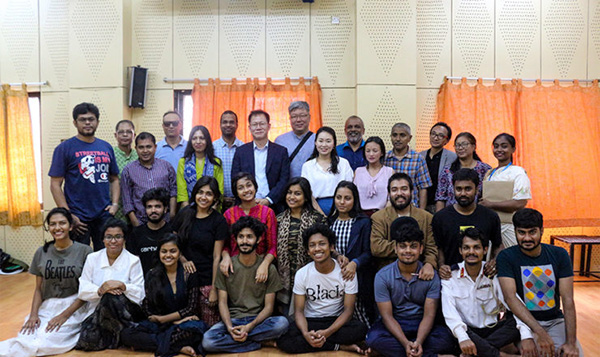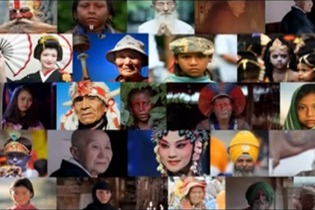Experts from South Asia Discuss ICH Education in Bangladesh
 |
| The participants and the students of University of Dhaka at the 2019 Sub-regional Meeting for ICH Safeguarding in South Asia ⓒ Boram Kim |
Living heritage is viable through transmission that takes place in various formats and places. Transmission of intangible cultural heritage (ICH) occurs within formal education1. in schools as well as through non-formal education outside of school curricula. Places of transmission can also vary from schools to community centers to private spaces.
The 2019 Sub-regional Meeting for ICH Safeguarding in South Asia was held from 24 to 26 June in Dhaka, Bangladesh, to examine the current status of ICH education in South Asia and discuss the future. The meeting, co-organized ICHCAP and the UNESCO Dhaka Office, was participated by twenty-seven government officials and civil society members from six South Asian countries (Bhutan, Bangladesh, India, Maldives, Nepal, and Sri Lanka),as well as cultural and education experts from UNESCO offices. During the meeting, they shared national education policies and activities for ICH safeguarding and discussed future cooperation projects.
A participant of the meeting said, “Although the term ‘ICH’ is not specifically mentioned, ICH has been taught in various forms and languages in the field.” The participant emphasized that “In order to integrate ICH into public education through policies, education experts should first respect and recognize the value of ICH.”
Speakers pointed out that although many South Asian countries have included ICH in their education policies, there are few cases where ICH education is systematically implemented. They thus emphasized urgent cooperation among different domains at national levels. As it is practically difficult to change national education curriculums due to various restrictions, however, the participants discussed possibilities of ICH education through extracurricular activities and community centers actively operated in South Asian countries, among others.
In particular, there was an opinion that countries should start with what they can do now, such as integrating ICH within the existing framework of education for sustainable development (ESD) or global citizenship education (GCED) to teach the importance and value of ICH and inviting community practitioners to schools.
One of the participants said, “If there is a market, it will naturally support education” while education about the social significance of ICH, community cohesion and identity is still important, highlighting the economic value of ICH associated with vocational education.
On the last day of the meeting, the participants visited the Society for the Welfare of Autistic Children, a Bangladesh NGO that uses ICH in education of autistic children as well as the performing arts department of the University of Dhaka to experience ICH education in the context of formal and non-formal education.
During the meeting, ICHCAP explained its ICH safeguarding activities in South Asia and shared its plans for education projects, laying the ground for regional cooperation. ICHCAP has been operating various projects that integrate ICH and education in earnest since the establishment of the Higher Education Network for Safeguarding Intangible Cultural Heritage in 2018. This year, ICHCAP has been expanding its efforts in education projects: it is examining the current status of ICH education in the Asia Pacific region with UNESCO Bangkok Office and developing teaching plans for elementary school children in cooperation with Jeonju National University of Education, among other efforts. ICHCAP will support the transmission of ICH through projects to develop teaching plans and materials that can be used in South Asia, based on the discussion results of the meeting.
Notes 1. Formal education is education delivered in a systematic intentional way, especially within a school. Non-formal education refers to various forms of education delivered outside of formal education.

Address: 81, Laiguangying West Road, Chaoyang District, Beijing, China
Zip Code: 100021
Tel: 86-10-64966526
Fax: 86-10-64969281
E-mail: crihap@crihap.cn
Leave us your e-mail address, we'll let you know about current events.



